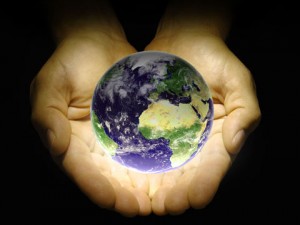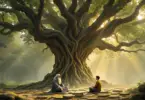By Cynthia Frisch
Guest writer for Wake Up World
As a child, whenever near a river, I always wanted to find its beginning and end, an adventure that usually ended with rather wet and muddy results. Rivers followed me into adulthood in both concrete and metaphoric ways. In 1982, when my meditation friends were given elegant spiritual names of gods and goddesses, I was given the rather unpoetic name “Tunga,” which sounded to me like an Amazonian queen. It was actually a sacred river in India, and years later on my first work trip to the Amazon River, the significance of that name became clear.
[pro_ad_display_adzone id=”110028″]
Phases of my life which at first appeared unrelated now feel like a confluence of rivers, merging to reveal insights into our world and what it might take to sustain it.
In 1996, after almost ten years living in a meditation center as a staff member for an international foundation, I experienced a series of incredibly synchronistic events that put me at the heart of the environmental movement. The scenery of my life suddenly changed from chanting and yoga to press conferences and public hearings. I threw myself into an intense rhythm with full force, for the rapids of the environmental movement rush furiously for those who understand that the deadline is just around the bend.
After three years of coalition building, grassroots advocacy, and legal and legislative action, something emerged from deep within me. The landscape of my spiritual background had given me a unique perspective, and I began to sense that something crucial was missing in the environmental movement. One day during meditation, an image appeared: I was leading a workshop and all the participants were crying—some with just a single tear, others truly sobbing. I knew these people had fully embraced their disconnection with the earth, and the pain from this awareness was overwhelming.
From this image, I realized that what was missing was a context for the environmental movement—one that had a spiritual foundation. I understood that, while critical, the activism and sustainable technological advances couldn’t fully accomplish the vision of protecting this amazing planet until humanity at large began to inwardly reconnect with the earth. I sensed the key to creating this context could be found in traditional cultures, where the ancient and intimate connection with nature was still alive.Humanity’s very own existence depended upon these cultures’ spiritual knowledge of nature, their practices of honoring the earth, and their connection to the earth’s mystical secrets.
My spiritual path and environmental work began to converge with yet another tributary: training as an anthropologist. Calling my field of study “The Shamanic Paradigm of the Earth,” I established three goals: first, to study the fundamental principles of indigenous peoples and their relationship to the earth; second, to focus on how the medicine men and women of these cultures connect and communicate with the forces of nature; and third, to develop a means by which to bring this wisdom into mainstream culture.
Those three goals have guided the flow of my life since that time.
At a 2001 conference, I met Dr. Mark Plotkin, president of the Amazon Conservation Team, a non-profit organization that preserves Amazonian rainforest and the regions’ shamanic traditions. Mark brought a Colombian shaman to join him on a panel. When Don Luciano Mutumbajoy spoke, he gave voice to my inner-most thoughts, describing the pressing need for those of us in the dominant culture to embrace the spiritual technology of preserving the earth that comes from indigenous wisdom, not just pursue modern technological efforts. After his talk, he looked directly at me—and tears instantly came to my eyes.
A week later, I met Mark at his office near D.C., thus beginning my relationship as consultant and friend of the Amazon Conservation Team. With them and in other settings, I visited Brazil, Ecuador, and Peru and participated in various indigenous ceremonies.
While each was important and very powerful, I was still looking to awaken my own personal connection and direct communication with the elements of nature. That opportunity finally came when I met Dr. J.E. Williams, a naturopathic and shamanic healer and author of The Andean Codex. His Q’ero guide and elder, Sebastian, had received a message to initiate a small group of people outside of his community into his family’s traditional path of earth shamanism. I worked with Williams to organize that small group, and in the fall of 2007 we traveled to Peru.
During that extraordinary trip, a door that had always been within me suddenly opened. What we experienced was likened to a wedding with the Apus, the mountain spirits, and I was able to connect with them in the most tangible way. I recognized the elements, and the earth Herself, as indeed living beings, and I experienced firsthand the synergistic relationship between humans and the forces of nature. I had a life-changing awakening: humanity and the spirits of nature are in a reciprocal relationship of offering and receiving. We keep each other alive.
During our time together, Sebastian shared his great concern that the Apus could die if not ritually cared for and remembered. From his teachings, and my own experience, I clearly understood the necessity of spiritual exchange and the importance of bringing a massive shift in consciousness to the dominant cultures of the world.
While encouraged to see the decades of hard work by activists paying off with the popularity of the Green Movement, I am concerned that action is focused on the symptom of our environmental problems, not on the essential root cause, our spiritual disconnection from the earth. When people and businesses are joining in the momentum of “going green,” they do not necessarily understand the deeper context of being green—the state of consciousness from which authentic action springs.
In his book, Where Rivers and Mountain Sing, musicologist Theodore Levin describes fishing in central Asia with Tolya, a traditional Tuvan throat singer. Tolya sings to the water with extraordinary vocals that seem to amplify the river’s own sounds. He says he does this as an offering, because every natural place has a spirit-master who likes to hear the song of the place or thing it protects. When Levin asks, “So when you were just throat-singing, you were imitating the sound of the river’s own singing?” Tolya looks surprised. “Of course,” he replies. “The river is alive. Rivers sing.”
My work and my hope is that, like Tolya, we and future generations come to know once again the songs of the Earth and of those places in nature we hold dear. No doubt, you will find me by the banks of a river.
Previous articles by Cynitha
About the Author
 Cynthia Frisch cultivates connections between Earth and people in businesses, organizations and communities through her company Gaia Global Consulting. Her seminar “Ancient Wisdom for Environmental Corporate Leadership” interjects traditional worldviews and values into the modern dialogue about sustainable environmental practices. A facilitator of Pachamama Alliance’s Awakening the Dreamer, Changing the Dream Symposium and her own workshop The Power of Earth, she also serves as an Ambassador for Change with the Green Energy Council, where she integrates traditional earth wisdom into their Green Jobs Corp training.
Cynthia Frisch cultivates connections between Earth and people in businesses, organizations and communities through her company Gaia Global Consulting. Her seminar “Ancient Wisdom for Environmental Corporate Leadership” interjects traditional worldviews and values into the modern dialogue about sustainable environmental practices. A facilitator of Pachamama Alliance’s Awakening the Dreamer, Changing the Dream Symposium and her own workshop The Power of Earth, she also serves as an Ambassador for Change with the Green Energy Council, where she integrates traditional earth wisdom into their Green Jobs Corp training.
This article was originally published in Sacred Fire magazine
Sacred Fire magazine is an initiative of the Sacred Fire Foundation which seeks to help all people re-discover and celebrate the sacred, interconnected nature of life, a perspective held by indigenous peoples and spiritual traditions everywhere which is the source of all personal, cultural and environmental well-being.
Key initiatives include:
Sacred Fire magazine, which offers a fresh outlook on modern culture by showing the relevance of ancient ways to today’s world
Ancient Wisdom Rising, a series of gatherings with elders and wisdom keepers that offer hope, healing and renewed relationship with our sacred world
Sacred Fire Press, a book imprint that preserves and presents spiritual teachings from ancient and original sources
Wisdom Fellowships, bi-annual awards to tradition holders who are keeping the sacred fires of their people burning.
[pro_ad_display_adzone id=”110027″]







